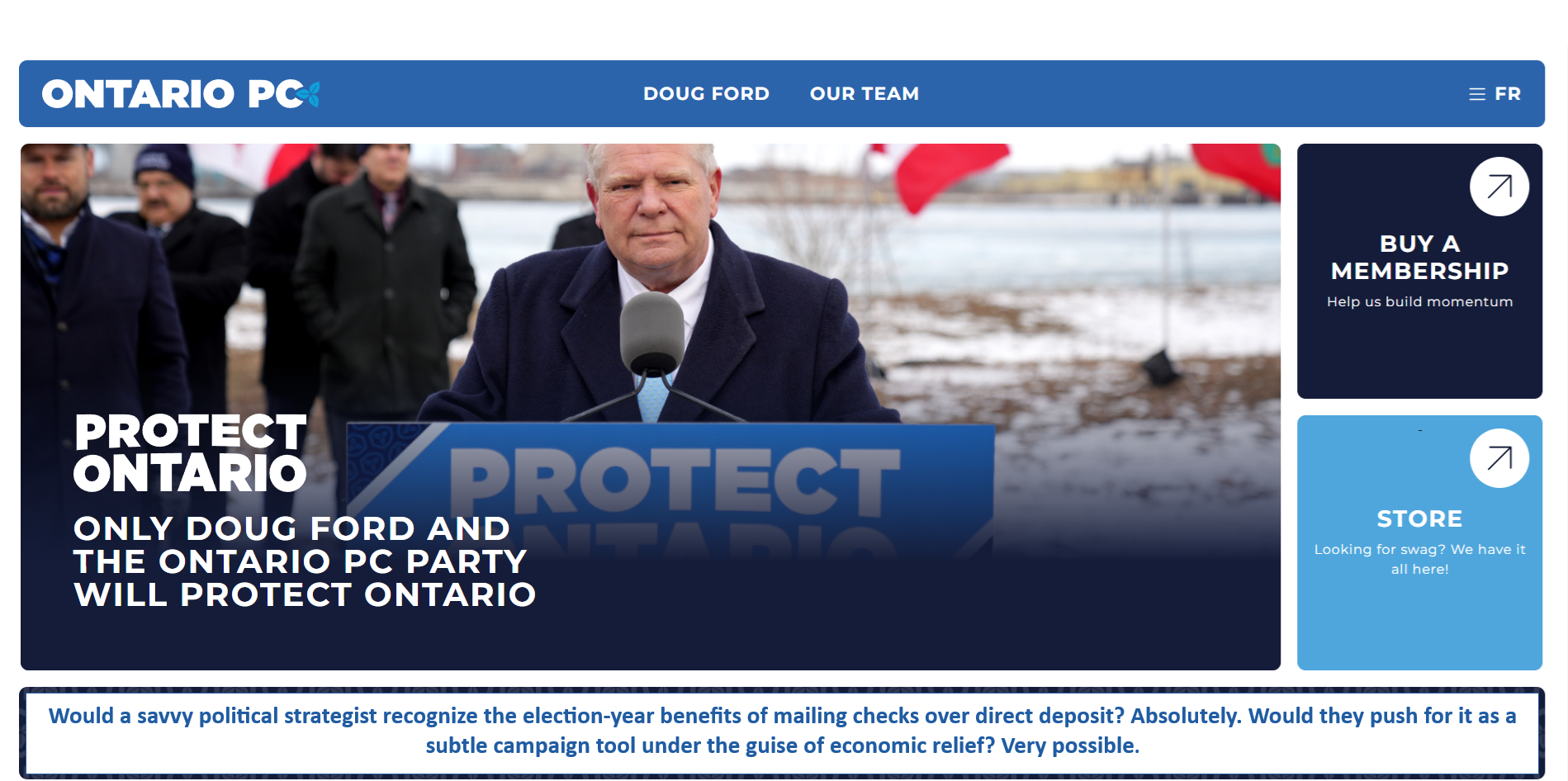The $338 Million Question

The $338 Million Question: Is Ontario’s Government Using Psychology to Influence the Election?
Table of Contents
- A Political Thriller Unfolds
- The Cold, Hard Math: How We Got $338 Million
- Election Timing: The Perfect Window to Influence Voters
- The Psychological Strategy: Why a Mailed Check Feels More Powerful Than Direct Deposit
- A Campaign Budget Loophole? Public Spending vs. Election Spending
- The Gray Area – Intent vs. Impact
- What Would the Government Say?
- Final Thought: Are You Asking the Right Questions?
- The Power Of a Question?
- The 338 Effect – The Power of Data
A Political Thriller Unfolds
Imagine the opening scene of a political drama: a high-level strategy meeting in late 2023. Advisors sit around a conference table, debating election tactics.
“How do we maximize voter goodwill before February?”
One strategist leans in.
“What if the government cuts 15 million checks right before the election? Not direct deposit—actual paper checks. It’ll cost more, but people will remember it. They’ll hold it. They’ll think, ‘Doug Ford gave me this.’”
Another smirks.
“It’s too expensive. People will ask why we didn’t do direct deposit.”
A senior voice interrupts:
“Think bigger. The spending itself is the point. We stimulate the economy, and the costs look like governance, not politics. It’s the perfect election-year maneuver.”
The room falls silent. A nod from the Premier.
“Let’s mail the checks.”
Now, let’s step back. This isn’t a movie. This is real taxpayer money. $338 million more than necessary is being spent on a choice—a choice to mail checks instead of clicking “Deposit.”
Why? Governments don’t waste money for no reason.
Let’s follow the money, unpack the psychology, and ask the questions that need to be asked.
The Cold, Hard Math: How We Got $338 Million
| Delivery Method | Estimated Cost (Low) | Estimated Cost (High) |
| Mailed Checks | $81.6M | $350.4M |
| Direct Deposits | $11.7M | $11.7M |
🔎 Breaking it down:
- The cost of direct deposit is $11.7 million for all 15 million recipients.
- The cost of mailing checks ranges from $81.6M to $350.4M, depending on printing, postage, labor, and administrative overhead.
- The difference? Up to $338.7 million.
And let’s not forget: Developing an online rebate tracking app would have cost only $2 million.
So again… why choose the most expensive option?
Election Timing: The Perfect Window to Influence Voters
- Ontario Election Date: February 27, 2025
- Mailed Checks Arrive: Mid-January through late February
- Final Checks in Mailboxes: Just as voters head to the polls
What happens when a government puts cold, hard cash in people’s hands right before an election? It creates a subconscious association.
💡 Is this a rebate—or a well-timed campaign stunt paid for with taxpayer money?
The Psychological Strategy: Why a Mailed Check Feels More Powerful Than Direct Deposit
1. The Endowment Effect: “It Feels Like a Gift”
- People value what they physically hold.
- A check in the mail feels like found money—like a personal reward from the government.
- A direct deposit? It disappears into your bank balance, blending into your existing funds.
2. The Ritual of Receiving Money
- Opening the envelope.
- Seeing your name on the check.
- Signing the back.
- Walking into a bank to deposit it.
Every step reinforces the memory of where this money came from.
3. Visibility vs. Forgettability
- A check in the mail = Tangible proof of government generosity.
- A direct deposit = Silent, invisible, no emotional connection.
💡 Which one do you think is more politically valuable?
A Campaign Budget Loophole? Public Spending vs. Election Spending
Ontario PC Campaign Budget: $8M–$10M.
Cost of Mailed Checks: Up to $350M.
Election laws cap direct campaign spending—but public spending isn’t restricted the same way.
- Where does that $350M go? Printing, postage, administrative processing—sectors that may have financial ties to political allies.
- Who really benefits? It’s not just Ontarians—this money moves through the economy in ways that aren’t always visible.
💡 Is this election-year economic stimulus… or taxpayer-funded political marketing?
The Gray Area – Intent vs. Impact
Most real-world governance falls in a gray area between ethical guidance and strategic influence.
🔹 Is mailing rebate checks purely for economic fairness? Possibly.
🔹 Does it also create a psychological advantage for the government during an election year? Undeniably.
🔹 Would a political team be aware of this effect and use it? 100% yes.
💡 The real ethical test? Whether the government is transparent about its intentions—or hiding a political strategy behind a policy decision.
What Would the Government Say?
💬 Soundbite for the Media:
“This is about jobs, fairness, and economic recovery. Every dollar spent on mailing these checks goes back into Ontario’s economy—keeping workers employed and ensuring families get the support they need. Unlike direct deposits that quietly disappear into bank accounts, these checks are a direct investment in our people, our businesses, and our future.”
🔎 Sounds good, right? But what’s left unsaid?
Final Thought: Are You Asking the Right Questions?
💡 This post isn’t about accusations—it’s about critical thinking.
The real question isn’t whether mailing checks is illegal. The question is: Would they have done this if it weren’t an election year?
And the real danger isn’t the cost. It’s not even the politics. The real danger is when we stop asking questions.
If we don’t ask, we’ll never know.
So, Ontario… are you paying attention?
Related Posts

The Power of a Question: How 200 Brady Street Turns Inquiry into Opportunity
The Power of a Question: How 200 Brady Street Turns Inquiry into OpportunityWhy Did Ontario…
